
Senior physics writer Emily Conover joined Science News in 2016. She has a Ph.D. in physics from the University of Chicago, where she studied the weird ways of neutrinos, tiny elementary particles that can zip straight through the Earth. She got her first taste of science writing as a AAAS Mass Media Fellow for the Milwaukee Journal Sentinel. She has previously written for Science Magazine and the American Physical Society. She is a two-time winner of the D.C. Science Writers’ Association Newsbrief award, and a winner of the Acoustical Society of America’s Science Communication Award.

Trustworthy journalism comes at a price.
Scientists and journalists share a core belief in questioning, observing and verifying to reach the truth. Science News reports on crucial research and discovery across science disciplines. We need your financial support to make it happen – every contribution makes a difference.
All Stories by Emily Conover
-
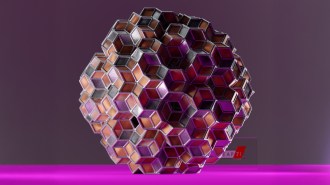 Physics
PhysicsPhysicists dream up ‘spacetime quasicrystals’ that could underpin the universe
Quasicrystals are orderly structures that never repeat. Scientists just showed they can exist in space and time.
-
 Physics
PhysicsA precise proton measurement helps put a core theory of physics to the test
After years of confusion, a new study confirms the proton is tinier than once thought. That enables a test of the standard model of particle physics.
-
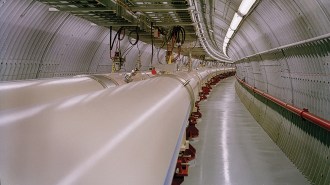 Physics
PhysicsThe only U.S. particle collider shuts down – so a new one may rise
The famed collider at Brookhaven National Laboratory has ended operations, but if all goes to plan, a new collider will rise from its ashes.
-
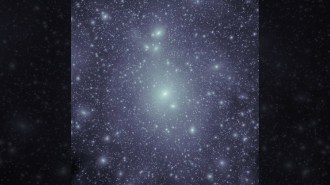 Physics
PhysicsA massive clump of dark matter may lurk in the Milky Way
Pulsating remnants of stars hint at a clump of invisible matter thought to be about 10 million times the sun’s mass.
-
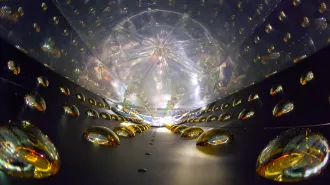 Particle Physics
Particle PhysicsPhysicists discovered neutrinos 70 years ago. The ghostly particles still have secrets to tell
Neutrinos have kept scientists on their toes in the decades since they were discovered.
-
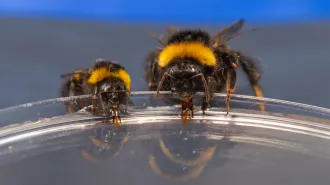 Physics
PhysicsQueen bumblebees are poor foragers thanks to sparse tongue hair
The density of fine hairs on bumblebees’ tongues determines how much nectar they can collect — and workers put queen bees to shame.
-
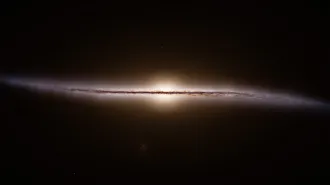 Particle Physics
Particle PhysicsEarth is bathed in droves of neutrinos spewed by the Milky Way’s stars
The subatomic particles are incredibly numerous. About 1,000 neutrinos from stars other than the sun pass through a thumbnail every second.
-
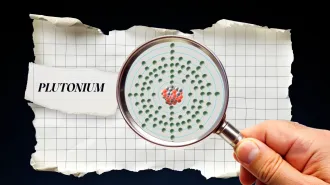 Physics
PhysicsHere’s the science behind nuclear weapons testing
Nuclear weapons haven’t been tested in the United States since 1992. Find out why, and what could happen if the hiatus ends.
-
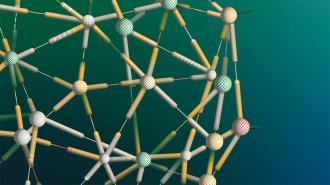 Artificial Intelligence
Artificial IntelligenceA quantum trick helps trim bloated AI models
Machine learning techniques that make use of tensor networks could manipulate data more efficiently and help open the black box of AI models.
-
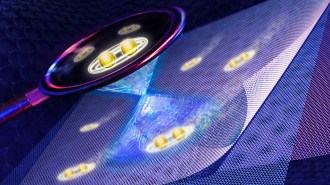 Physics
PhysicsTwisted stacks of 2-D carbon act like a weird type of superconductor
“Magic-angle” graphene may provide new clues into poorly understood unconventional superconductors, which operate at higher-than-normal temperatures.
-
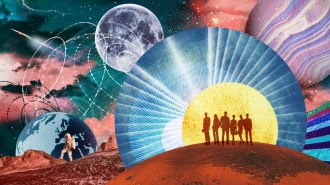 Space
SpaceAmerica risks losing its role as a space science pioneer
Funding uncertainties are pushing U.S. space scientists out of the field and putting existing and future space missions on the chopping block.
-
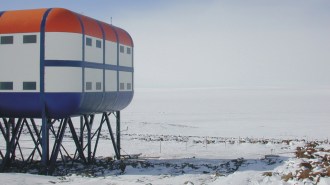 Science & Society
Science & SocietyIf another country tested nuclear weapons, here’s how we’d know
President Trump has argued the U.S. should test nuclear weapons because other countries are doing it. But scientific data suggest they’re not.